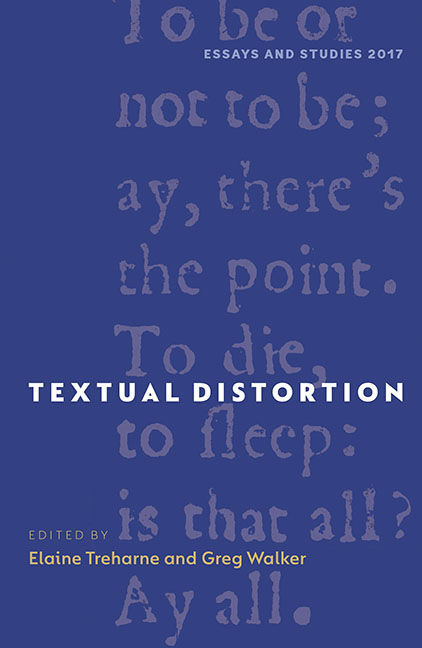Book contents
- Frontmatter
- Dedication
- Contents
- List of Illustrations
- Preface and Acknowledgements
- Notes on Contributors
- Introduction
- The Curious Production and Reconstruction of Oxford, Bodleian Library, Junius 85 and 86
- ‘Through a glass darkly’, or, Rethinking Medieval Materiality: A Tale of Carpets, Screens and Parchment
- Distortion, Ideology, Time: Proletarian Aesthetics in the Work of Lionel Britton
- Shakespeare and Korea: Mutual Remappings
- Dictionary Distortions
- Where Do Indigenous Origin Stories and Empowered Objects Fit into a Literary History of the American Continent?
- Distortion in Textual Object Facsimile Production: A Liability or an Asset?
- The Uncanny Reformation: Revenant Texts and Distorted Time in Henrician England
- The Presence of the Book
- Index
Where Do Indigenous Origin Stories and Empowered Objects Fit into a Literary History of the American Continent?
Published online by Cambridge University Press: 24 August 2019
- Frontmatter
- Dedication
- Contents
- List of Illustrations
- Preface and Acknowledgements
- Notes on Contributors
- Introduction
- The Curious Production and Reconstruction of Oxford, Bodleian Library, Junius 85 and 86
- ‘Through a glass darkly’, or, Rethinking Medieval Materiality: A Tale of Carpets, Screens and Parchment
- Distortion, Ideology, Time: Proletarian Aesthetics in the Work of Lionel Britton
- Shakespeare and Korea: Mutual Remappings
- Dictionary Distortions
- Where Do Indigenous Origin Stories and Empowered Objects Fit into a Literary History of the American Continent?
- Distortion in Textual Object Facsimile Production: A Liability or an Asset?
- The Uncanny Reformation: Revenant Texts and Distorted Time in Henrician England
- The Presence of the Book
- Index
Summary
For all of the changes that American literature has been through since the Culture Wars – African American, Asian American, Latina/o studies, feminism, queer theory, post-colonialism and transnationalism, to name just a few – perhaps the least understood part of American literary history is its very beginnings, rooted in Indigenous origin stories passed down as part of the oral tradition. If we return for a moment to the benchmark for measuring the increasing diversity of the canon of American literature, The Norton Anthology of American Literature, this distortion comes clearly into focus. As of this writing, the current eighth edition of the Norton Anthology's opening section, ‘Stories of the Beginning of the World’, contains just two origin stories – Navajo and Iroquois – before Columbus and the conquistadors claim the continent and colonise American literary history.
How can one measure such a massive distortion? First, the temporal distortion: recent archaeological excavations at San Bartolo revealed Maya glyphs in murals dating to around 300 BCE, nearly two millennia before Columbus wrote in his journal, ‘With fifty men we could subjugate them all and make them do what whatever we want.’ The Kwakwaka'wakw of British Columbia are still recounting stories performed as dances, with magnificent carved masks, and songs accompanied by a huge drum made out of a hollowed-out cedar log. The Kwakwaka'wakw say these stories are six thousand years old and very much alive. Second, the cultural distortion: in the Unites States alone there are currently more than 540 federally recognised tribes, each with their own distinct origin stories; to include only stories from two cultures thus grossly diminishes the cultural diversity hidden behind the term ‘Native American’. Third, the formal distortion: as the folklorist Barre Toelken points out, the term ‘oral tradition’ can inadvertently oversimplify a more holistic approach that could be more fully described as ‘performance of arts, crafts, foods, stories, songs, and dances’ enlivened by an ‘emotional commitment in the form of body movement, breathing, use of vocal cords, tasting, and hearing the resultant “texts”, better understood as “constellations of meaning”’. And yet, because American literary scholars do not, generally speaking, do field work, most encounter origin stories primarily in print form.
- Type
- Chapter
- Information
- Textual Distortion , pp. 98 - 116Publisher: Boydell & BrewerPrint publication year: 2017



